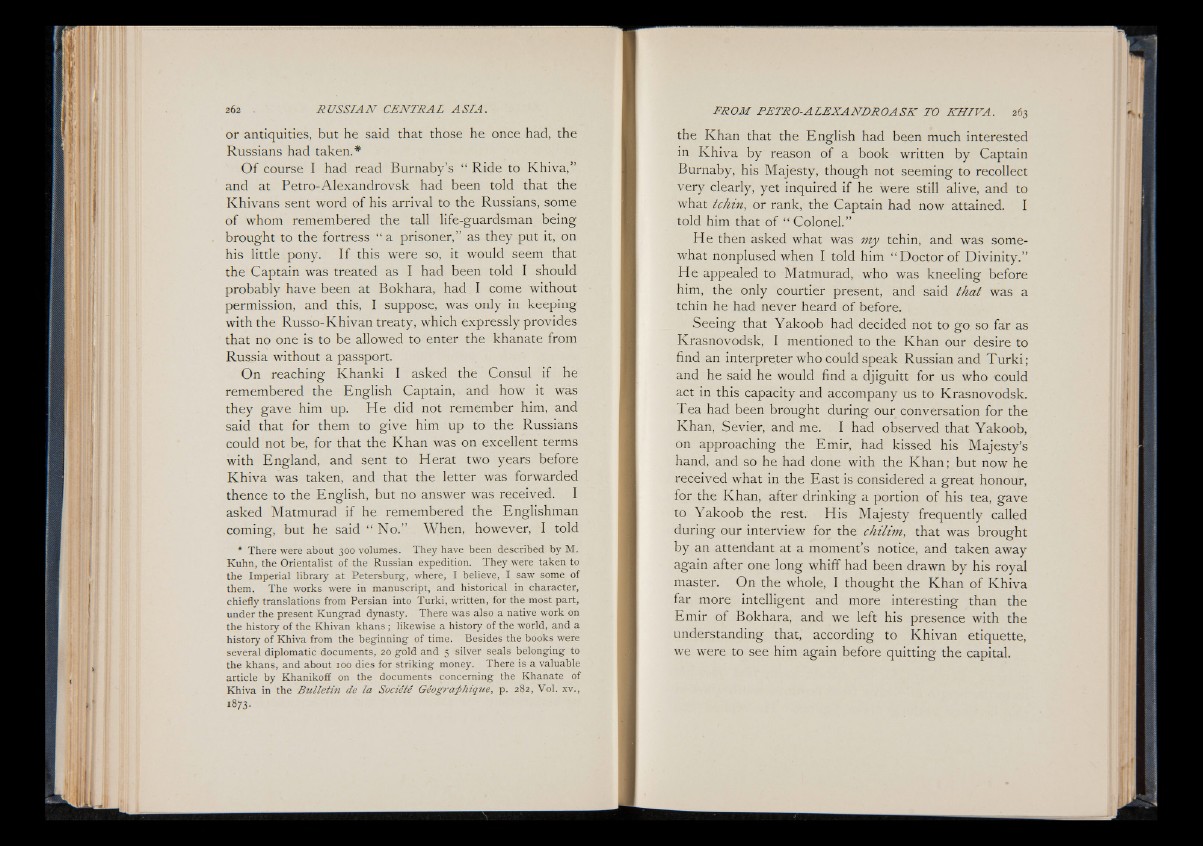
or antiquities, but he said that those he once had, the
Russians had taken.*
O f course I had read Burnaby’s “ Ride to Khiva,”
and at Petro-Alexandrovsk had been told that the
Khivans sent word of his arrival to the Russians, some
of whom remembered the tall life-guardsman being
brought to the fortress “ a prisoner,” as they put it, on
his little pony. I f this were so, it would seem that
the Captain was treated as I had been told I should
probably have been at Bokhara, had I come without
permission, and this, I suppose, was only in keeping
with the Russo-Khivan treaty, which expressly provides
that no one is to be allowed to enter the khanate from
Russia without a passport.
On reaching Khanki I asked the Consul if he
remembered the English Captain, and how it was
they gave him up. He did not remember him, and
said that for them to give him up to the Russians
could not be, for that the Khan was on excellent terms
with England, and sent to Herat two years before
Khiva was taken, and that the letter was forwarded
thence to the English, but no answer was received. I
asked Matmurad if he remembered the Englishman
coming, but he said “ No.” When, however, I told
* There were about 300 volumes. They have been described by M.
Kuhn, the Orientalist of the Russian expedition. They were taken to
the Imperial library at Petersburg', where, I believe, I saw some of
them. The works were in manuscript, and historical in character,
chiefly translations from Persian into Turki, written, for the most part,
under the present Kungrad dynasty. There was also a native work on
the history of the Khivan khans ; likewise a history of the world, and a
history of Khiva from the beginning of time. Besides the books were
several diplomatic documents, 20 gold and 5 silver seals belonging to
the khans, and about 100 dies for striking money. There is a valuable
article by Khanikoff on the documents concerning the Khanate of
Khiva in the Bulletin de la Société Géographique, p. 282, Vol. xv.,
i 873-
the Khan that the English had been much interested
in Khiva by reason of a book written by Captain
Burnaby, his Majesty, though not seeming to recollect
very clearly, yet inquired if he were still alive, and to
what tchin, or rank, the Captain had now attained. I
told him that of “ Colonel.”
He then asked what was my tchin, and was somewhat
nonplused when I told him “ Doctor of Divinity.”
He appealed to Matmurad, who was kneeling before
him, the only courtier present, and said that was a
tchin he had never heard of before.
Seeing that Yakoob had decided not to go so far as
Krasnovodsk, I mentioned to the Khan our desire to
find an interpreter who could speak Russian and Turki;
and he said he would find a djiguitt for us who could
act in this capacity and accompany us to Krasnovodsk.
T ea had been brought during our conversation for the
Khan, Sevier, and me. I had observed that Yakoob,
on approaching the Emir, had kissed his Majesty’s
hand, and so he had done with the K h an ; but now he
received what in the East is considered a great honour,
for the Khan, after drinking a portion of his tea, gave
to Yakoob the rest. His Majesty frequently called
during our interview for the chilim, that was brought
by an attendant at a moment’s notice, and taken away
again after one long whiff had been drawn by his royal
master. On the whole, I thought the Khan o f Khiva
far more intelligent and more interesting than the
Emir of Bokhara, and we left his presence with the
understanding that, according to Khivan etiquette,
we were to see him again before quitting the capital.